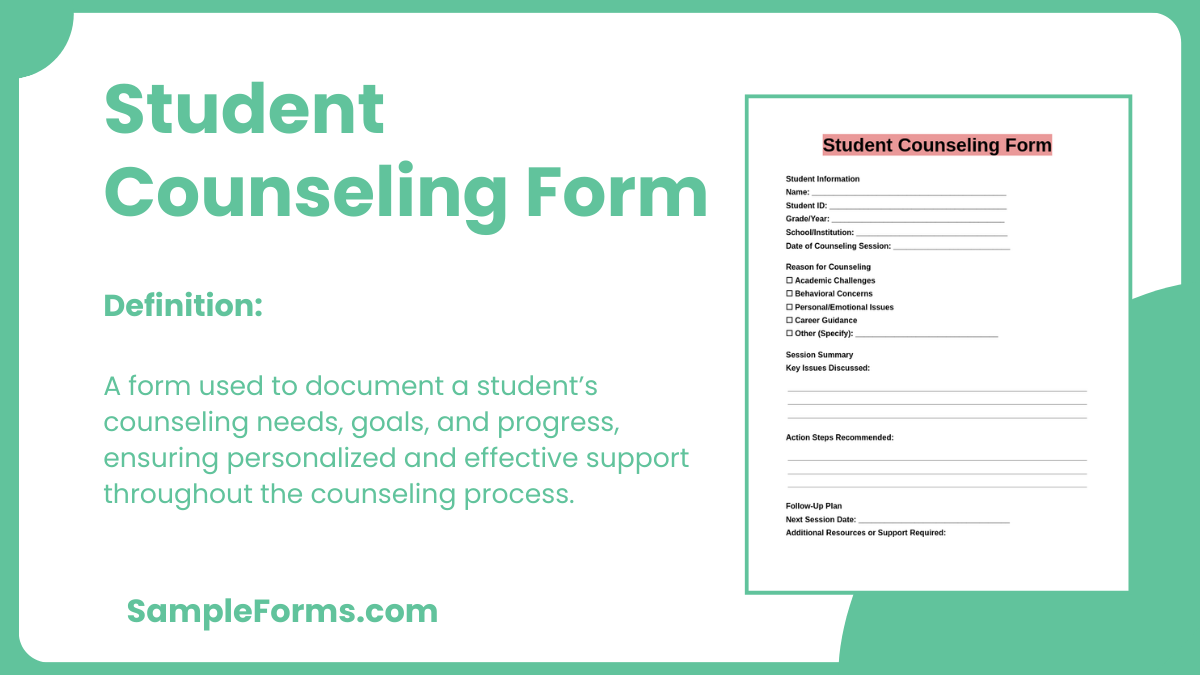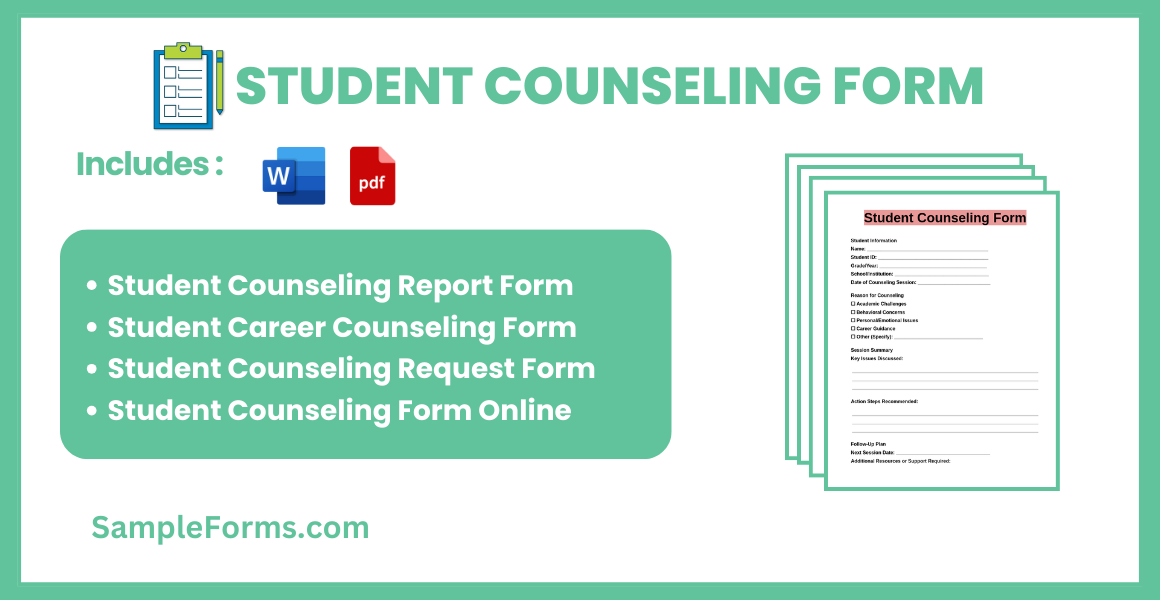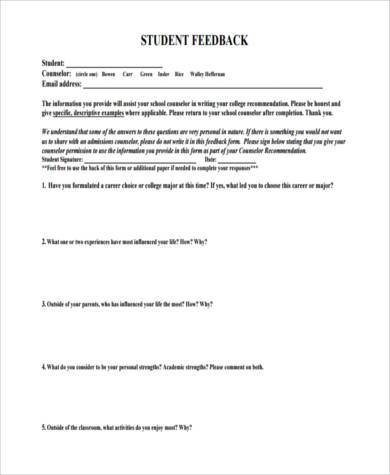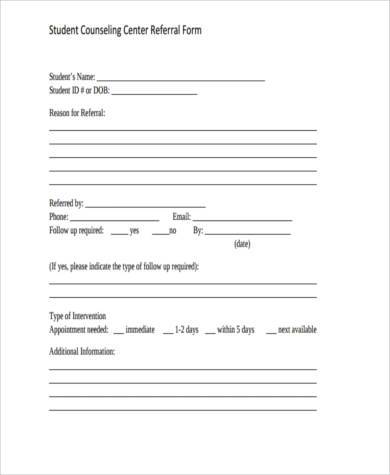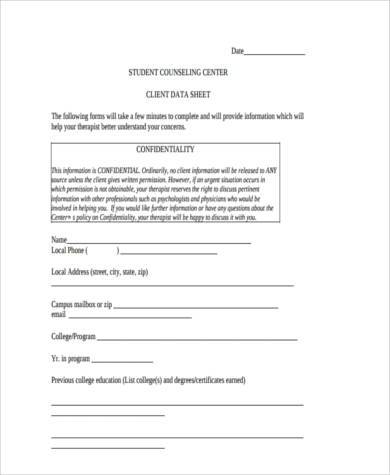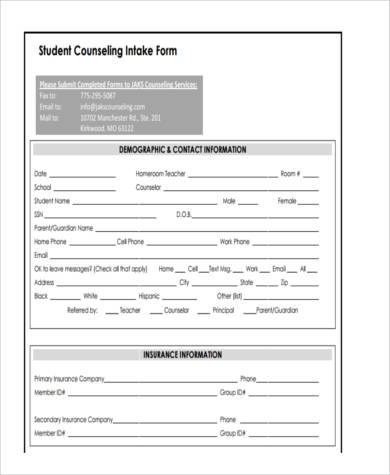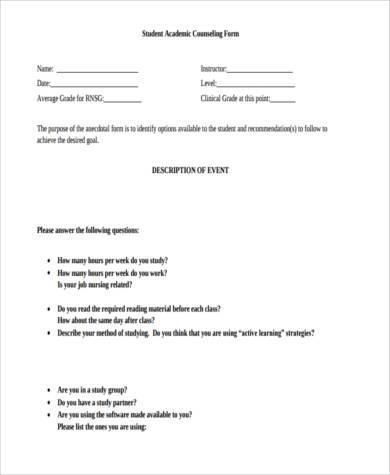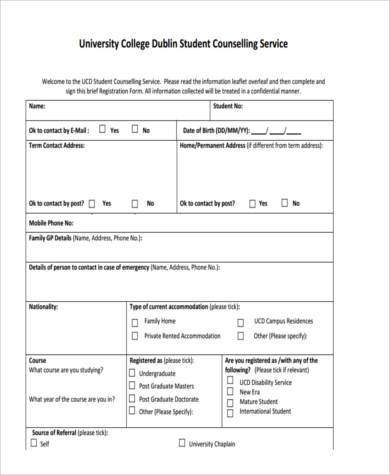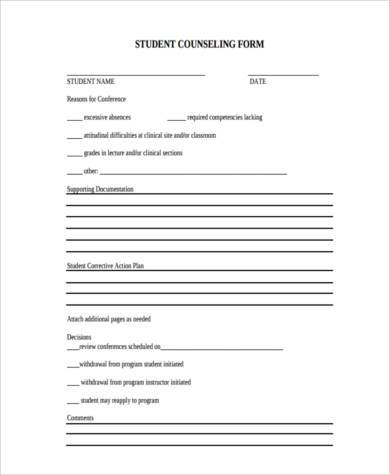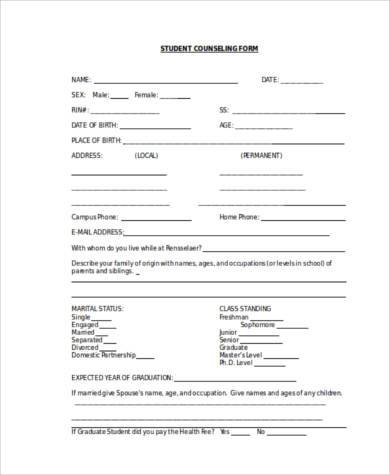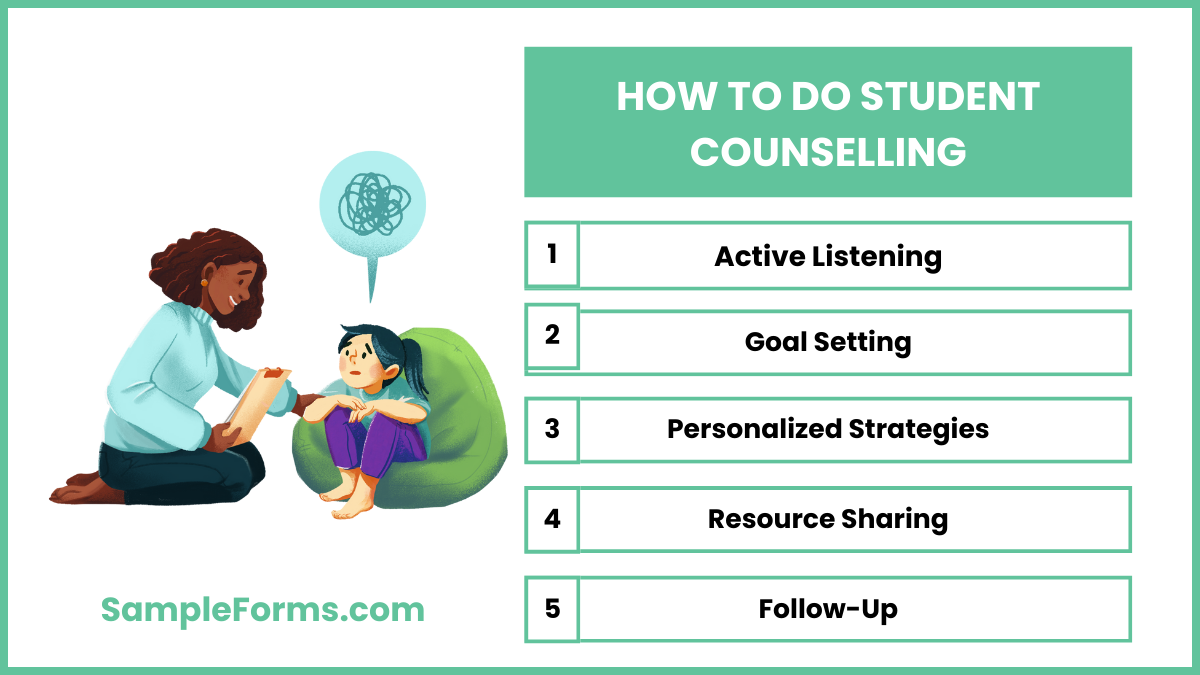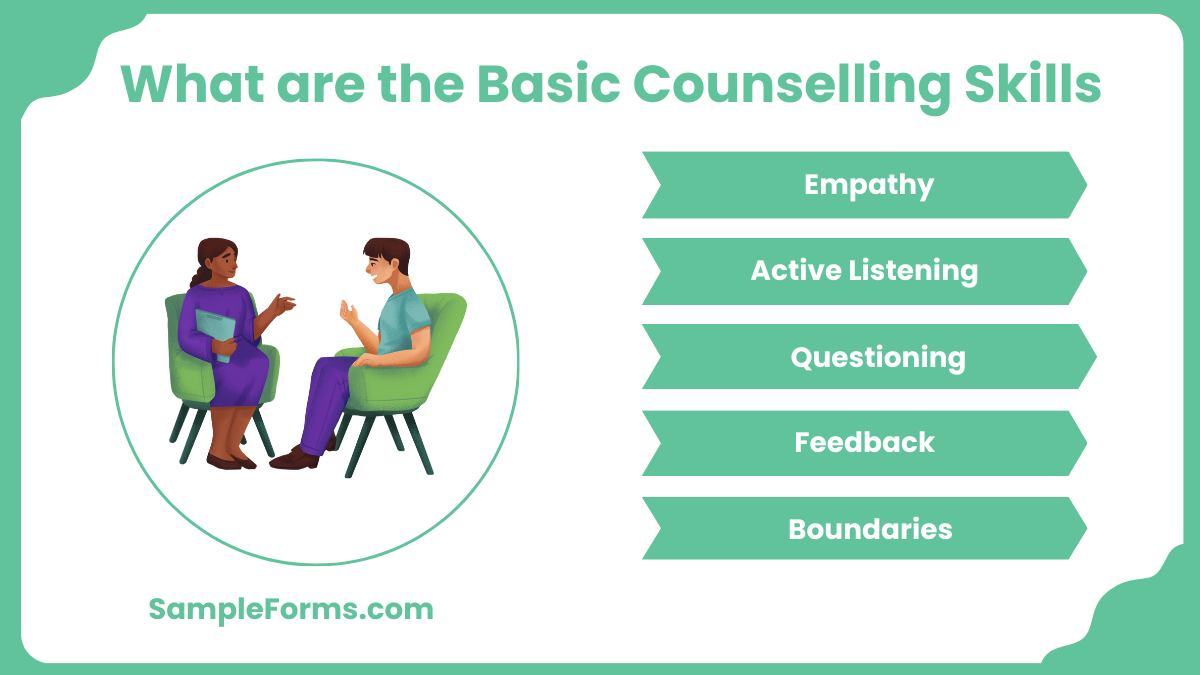A Student Counseling Form plays a pivotal role in ensuring students receive structured support throughout their academic and personal development. The process begins with identifying each learner’s unique needs, from emotional well-being to career planning. By incorporating a Counseling Form that captures current performance, goals, and concerns, educators and counselors can develop tailored action plans. Effective counseling also involves ongoing communication with faculty, parents, and other relevant stakeholders, allowing for timely intervention and continuous progress reviews.
Download Student Counseling Form Bundle
What is Student Counseling Form?
A Student Counseling Form is a formal document designed to gather and analyze crucial student information for academic and emotional guidance. It typically includes personal details, identified challenges, goals, and recommended action steps. By examining patterns in behavior, attendance, or coursework, counselors and teachers can uncover underlying issues affecting students’ overall well-being. This form helps track progress, ensuring that any intervention is both targeted and timely.
Student Counseling Format
Student Information
Name: __________________________
Student ID: __________________________
Grade/Year: __________________________
Contact Information: __________________________
Counseling Details
- Reason for Counseling:
- Date of First Session:
- Frequency of Sessions:
Goals and Progress
- Identified Goals:
- Progress Notes:
Parent/Guardian Details (if applicable)
Name: __________________________
Relationship to Student: __________________________
Signature: __________________________
Counselor Information
Name: __________________________
Signature: __________________________
Date: __________________________
Student Counseling Report Form
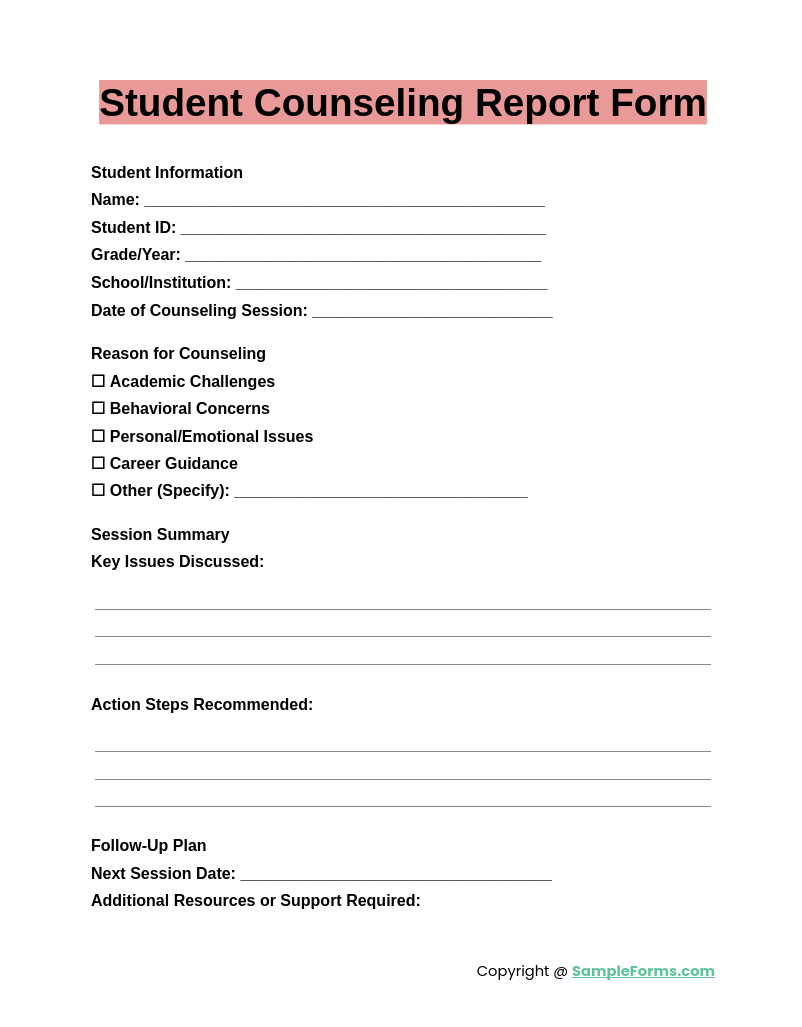
A Student Counseling Report Form offers an overview of session outcomes, progress, and next steps. Similar to a Counseling Application Form, it ensures accurate documentation of goals, interventions, and feedback. This clarity fosters strong communication among counselors, teachers, and students.
Student Career Counseling Form
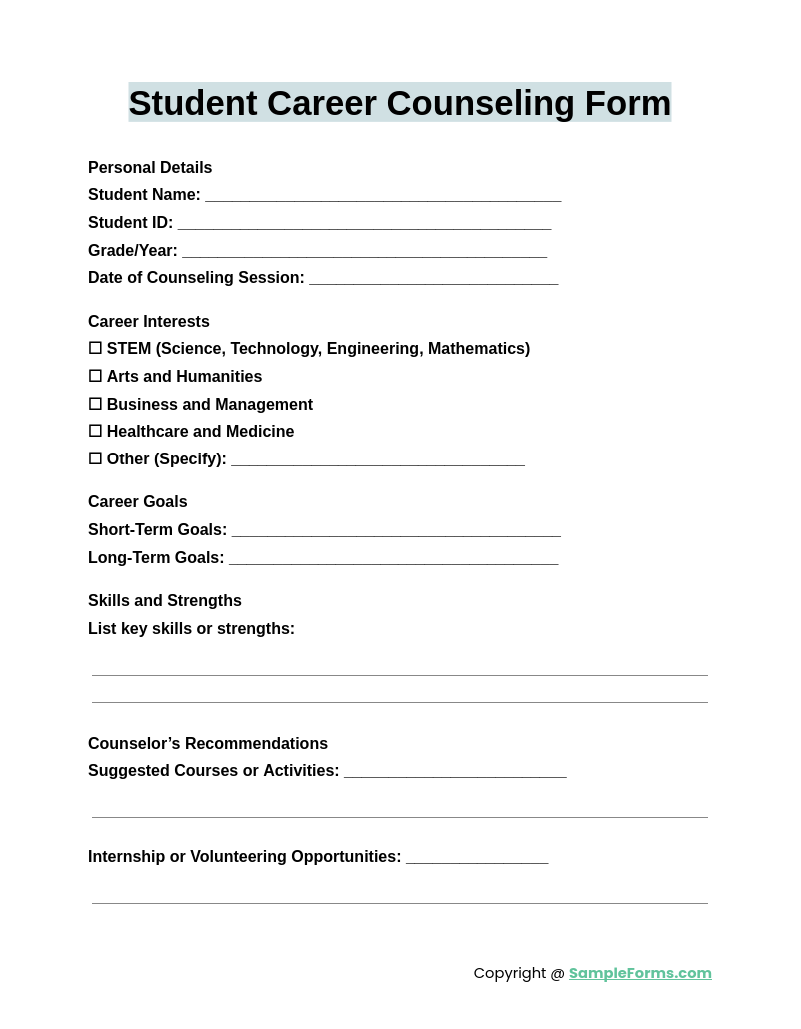
A Student Career Counseling Form clarifies academic paths, vocational goals, and long-term aspirations. Similar to an Army Counseling Form, it streamlines essential data, guiding counselors to tailor supportive strategies that build motivation, confidence, and clarity for future success and direction.
Student Counseling Request Form
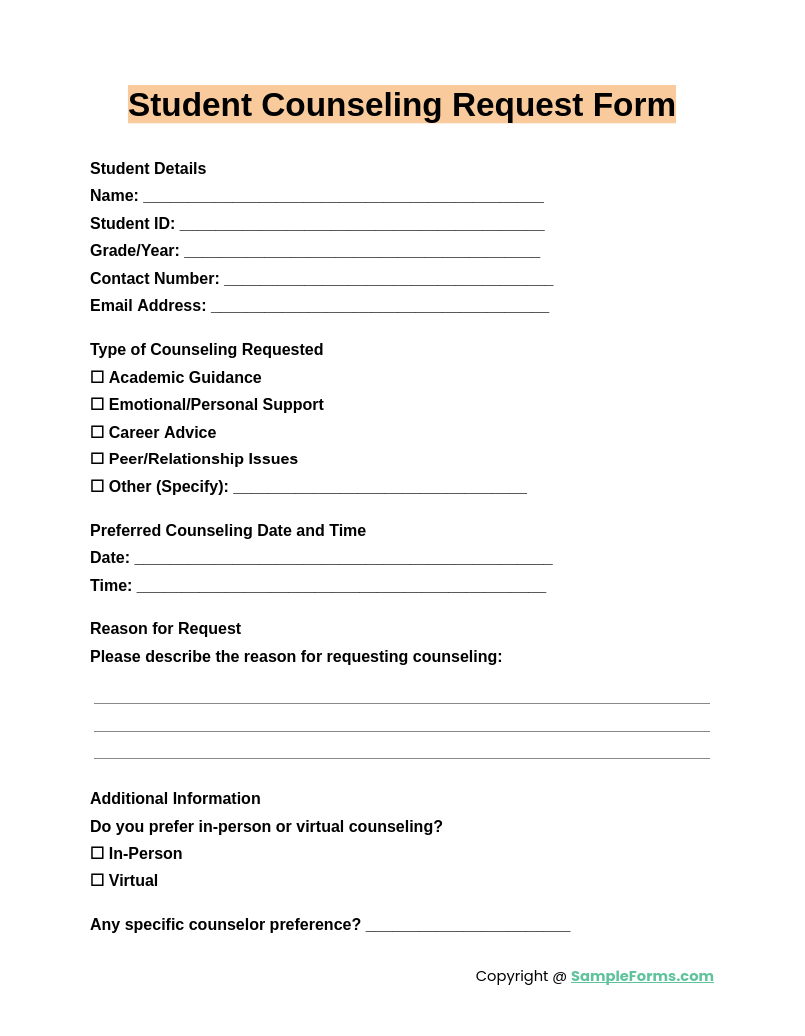
A Student Counseling Request Form initiates timely intervention when concerns arise, ensuring swift engagement. Similar to a Counseling Intake Form, it prompts vital information gathering, helping counselors identify pressing issues and plan purposeful strategies for successful academic or personal support.
Student Counseling Form Online
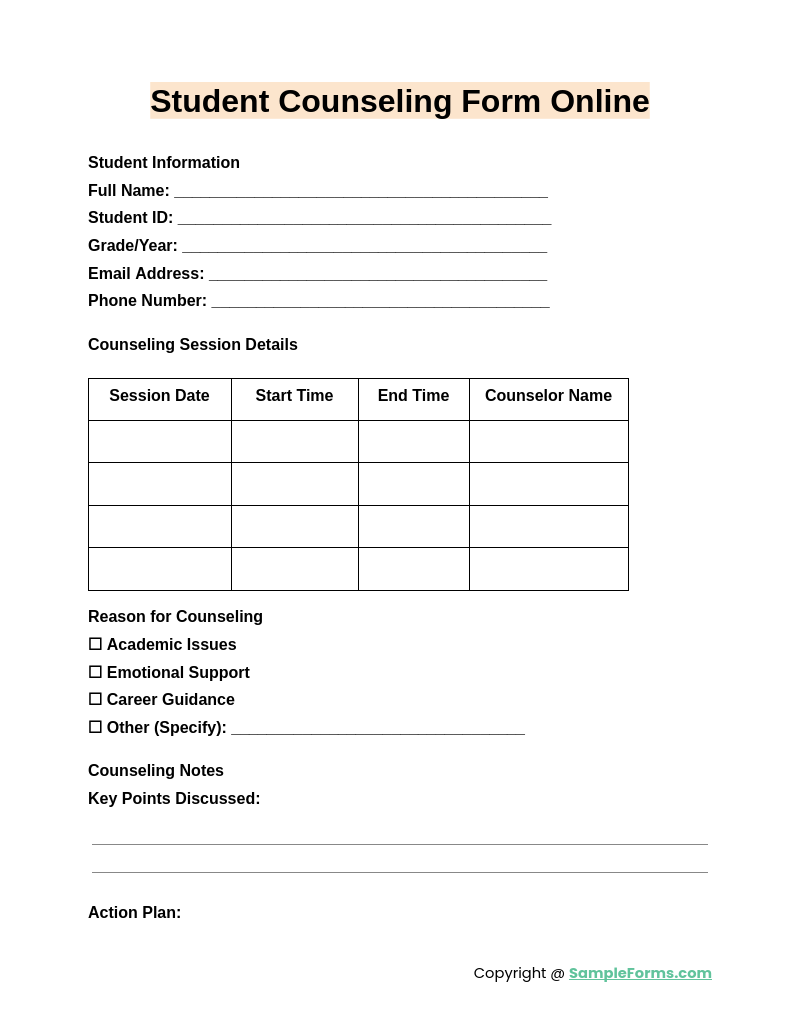
A Student Counseling Form Online streamlines remote sessions, enabling efficient data collection and monitoring. Similar to an Initial Counseling Form, it captures relevant background, issues, and objectives, promoting organized interactions and targeted interventions for improved student well-being and academic outcomes.
Browse More Student Counseling Forms
Student Counseling Feedback Form
Student Counseling Referral Form
Professional Student Counseling Form
Student Counseling Intake Form
Student Academic Counseling Form
Student Counseling Form in PDF
Student Counselling Registration Form
Student Counseling Form Example
Student Counseling Form in Word Format
How to do student counselling?
For truly effective student counseling, professionals gather complete background details, set clear goals, build trust, and employ supportive, empathetic interventions.
- Active Listening: Demonstrate empathy by restating concerns.
- Goal Setting: Introduce objectives, similar to a Counseling Referral Form, ensuring clear direction.
- Personalized Strategies: Customize advice based on individual needs.
- Resource Sharing: Provide relevant tools and references.
- Follow-Up: Schedule check-ins to maintain progress and accountability.
What is student loan entrance counseling?
Student loan entrance counseling thoroughly prepares borrowers for financial responsibility, loan terms, and repayment strategies, ensuring informed consent before borrowing.
- Requirement Overview: Understand legal and institutional obligations.
- Budget Planning: Forecast expenses and potential savings.
- Career Mapping: Align decisions, similar to a Career Counseling Form, guiding focused pathways.
- Loan Repayment Options: Compare interest rates and schedules.
- Preventive Measures: Recognize warning signs to avoid default.
How do school counselors assess students?
School counselors evaluate academic, social, and emotional factors, employing standardized tools and observations to tailor individualized support for every learner.
- Initial Observation: Note behavioral cues in class settings.
- Document Review: Check prior reports, akin to an Employee Counseling Form, for background.
- Testing Instruments: Administer achievement or aptitude tests.
- Interviews: Gather insights from teachers, parents, and peers.
- Progress Tracking: Reassess periodically to refine strategies.
How to counsel a teenager?
Counseling adolescents effectively requires empathy, active listening, and respect for boundaries, focusing on emotional stability, identity development, and academic success.
- Rapport Building: Use casual conversation to ease tensions.
- Open-Ended Questions: Encourage self-expression and deeper reflection.
- Structured Goals: Outline objectives, similar to a School Counseling Form, aligning progress to measurable targets.
- Positive Reinforcement: Celebrate small wins for motivation.
- Confidential Support: Maintain trust without breaching mandatory reporting duties.
What are the basic counselling skills?
Effective counseling demands five fundamental skills to ensure strong client relationships, promote understanding, and encourage positive behavioral transformation throughout sessions.
- Empathy: Show genuine concern for the client’s perspective.
- Active Listening: Reflect and clarify to confirm comprehension.
- Questioning: Use open-ended inquiries for deeper insights.
- Feedback: Offer constructive input, similar to a Counseling Feedback Form, ensuring continuous growth.
- Boundaries: Establish clear limits to maintain professionalism.
What is the best form of counseling?
Solution-Focused Brief Therapy often proves highly effective, emphasizing clear goals and quick outcomes. Similar to a Performance Counseling Form, it pinpoints objectives, engages the client’s strengths, and maintains a structured plan for measurable, sustained improvement.
Do students get free therapy?
Many institutions offer no-cost counseling for enrolled students, addressing academic or personal challenges. Similar to a Patient Counseling Form, each session gathers key information, ensuring targeted support and safeguarding overall well-being without added financial strain.
Do student counselors get paid?
Remuneration varies by institution and internship policies, with some positions paid while others remain volunteer-based. Similar to a Developmental Counseling Form, role definitions clarify responsibilities, ensuring counselors hone skills through structured guidance, leading to compensation.
What therapy is best for trauma?
Trauma-Focused Cognitive Behavioral Therapy (TF-CBT) is widely recognized for addressing deep-seated emotional wounds. Similar to a Counseling Statement Form, it clarifies objectives, ensures accountability, and systematically processes traumatic memories for meaningful, enduring, and healthy recovery.
What is a counseling certificate?
A counseling certificate verifies training in mental health support or advisory roles. Similar to a Student Affidavit Form, it authenticates competence, allowing professionals to display credentials and assure clients of their educational background and abilities.
What does MA stand for in counseling?
MA means Master of Arts, signifying graduate-level expertise in counseling or psychology. Similar to a Student Application Form, formal acceptance into programs cements academic achievements, ensuring qualifications meet professional and ethical standards for effective practice.
Is school counseling a hard job?
School counseling can be demanding, balancing academic guidance and emotional support daily. Similar to a Student Feedback Form, systematic input helps counselors refine approaches, manage stress, and maintain success in fostering student growth and well-being.
Is teen counseling free?
Some organizations and schools provide complimentary counseling services for teenagers, although availability varies. Similar to a Student Consent Form, documentation ensures ethical standards, parental permission if needed, and effective support for adolescent mental health needs.
What is a school counseling appraisal?
A school counseling appraisal evaluates counselor effectiveness, setting improvement goals. Similar to a Student Observation Form, it gathers objective evidence, measuring program impact on academic, personal, and career development, ensuring progress aligned with best practices.
What does student Counselling do?
Student counseling addresses academic, emotional, and social challenges, offering tailored strategies for improvement. Similar to a Student Transfer Form, it tracks transitions, ensuring each learner’s well-being, and positive integration into new educational or personal environments.
A well-prepared Student Counseling Form remains indispensable for guiding and supporting learners in various academic settings. It provides a consistent framework for identifying core issues, documenting constructive feedback, and reinforcing vital study or coping strategies. By maintaining clear communication channels, it promotes trusting relationships and effective collaboration among students, staff, and families. Regular assessments ensure individualized solutions that adapt to each learner’s evolving challenges. Furthermore, this systematic approach allows educators to monitor progress accurately, celebrate achievements, and address any gaps promptly. Ultimately, thorough counseling records enrich the educational process and create the foundation for positive long-term outcomes. Coupled with the Student Reimbursement Form, these tools uphold accountability, progress evaluation, and a supportive environment that empowers learners to thrive in their academic and personal lives.
